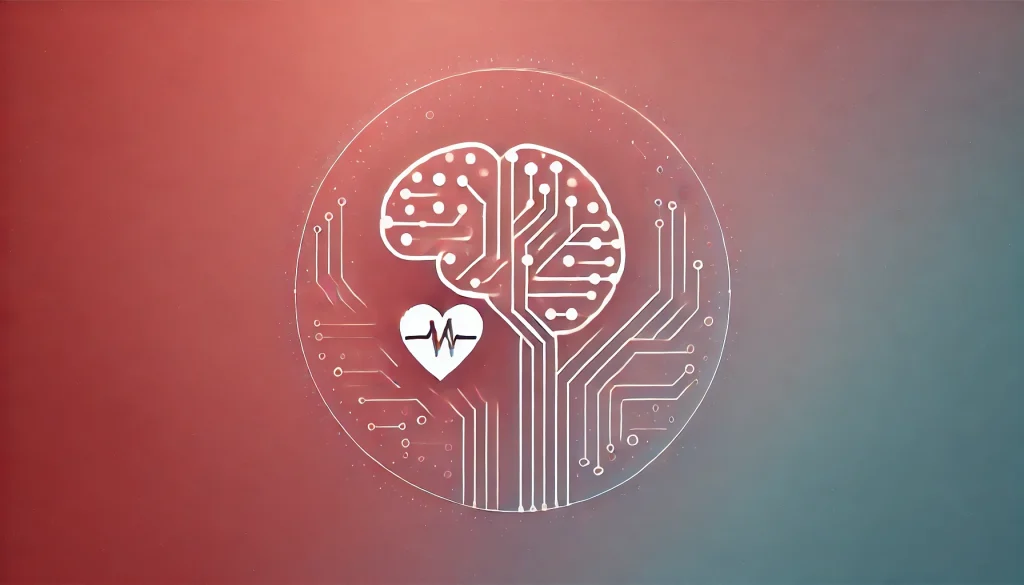AI in Healthcare: Benefits and Innovations 2025

AI in Healthcare: The healthcare industry is undergoing a transformative change thanks to Artificial Intelligence (AI). While AI’s influence spans various sectors, its role in healthcare has been nothing short of revolutionary. From streamlining administrative tasks to delivering precise medical diagnoses, AI is becoming a powerful force in shaping the future of healthcare. By enhancing patient care, reducing costs, and improving efficiency, AI is bringing unprecedented advancements to a field that has long needed innovation. In this article, we’ll explore the various ways AI is revolutionizing healthcare and the positive impact it has had on patient outcomes, medical research, and the overall healthcare ecosystem.
Table of Contents
1. Enhanced Medical Diagnostics
One of the most impactful ways AI in Healthcare is transforming healthcare is through enhanced medical diagnostics. Traditionally, diagnosing diseases often relied on a combination of a physician’s expertise and diagnostic tools such as imaging or lab tests. While this has worked for centuries, human errors can occur, and some conditions, especially rare ones, may be misdiagnosed. AI can change this by providing an extra layer of accuracy and speed.
AI in Radiology
AI in Healthcare-powered tools have made their mark in radiology by improving the accuracy of imaging diagnostics. AI algorithms can analyze medical images, such as X-rays, MRIs, and CT scans, to detect abnormalities that might be overlooked by the human eye. A case in point is Google’s DeepMind, which developed an AI system capable of diagnosing over 50 eye diseases by analyzing retina scans. Similarly, AI algorithms have been used to detect early signs of cancer, such as breast cancer, with a level of precision that rivals experienced radiologists.
AI for Early Disease Detection
AI in Healthcare isn’t just helping with diagnosing existing conditions; it’s playing a critical role in early disease detection. Machine learning algorithms can sift through vast amounts of patient data, from genetic information to medical history, to identify individuals who may be at risk for developing certain diseases. This proactive approach to healthcare allows for earlier intervention and, potentially, more successful outcomes. For example, IBM Watson Health uses AI to help predict heart disease in patients by analyzing large data sets that include lifestyle, genetics, and clinical history.
AI in Pathology
Pathology, the study of tissues and body fluids to diagnose diseases, is another field where AI is making an impact. By analyzing digital pathology slides, AI can assist pathologists in identifying cancerous cells or predicting how a disease might progress. AI tools like PathAI help in analyzing biopsy samples faster and with greater accuracy, reducing the likelihood of human error and expediting the treatment process.
2. Personalized Treatment Plans
Every patient is different, and their treatment should reflect that individuality. Historically, healthcare has relied on a one-size-fits-all approach when treating patients. However, AI in Healthcare is helping pave the way for more personalized medicine, which tailors treatment plans to the specific needs and characteristics of individual patients.
Genomics and Precision Medicine
AI in Healthcare plays a critical role in genomics, the study of genes and their functions, by analyzing vast quantities of genetic data. AI can identify patterns and mutations in DNA that might be associated with specific diseases. Once these insights are gained, doctors can design targeted therapies based on a patient’s genetic makeup. This precision medicine approach is particularly beneficial in the treatment of cancers, where different genetic mutations may require different treatment strategies.
For example, AI in Healthcare can analyze the genome of a cancer patient and predict which treatments are likely to be the most effective based on that patient’s specific genetic profile. AI-driven platforms like Tempus are already using genomic data to help doctors develop personalized cancer treatment plans. This reduces trial and error and allows for more effective, targeted therapies.
AI in Drug Discovery
Personalized medicine also extends to drug discovery, where AI is accelerating the process of developing new drugs tailored to individual patient needs. Traditionally, drug discovery has been a lengthy and expensive process, often taking years and billions of dollars to bring a new drug to market. AI is changing that by analyzing vast datasets to predict how different drugs will interact with specific biological targets. This can significantly reduce the time it takes to develop and test new treatments.
For instance, Insilico Medicine is a company using AI to simulate thousands of molecular interactions to identify potential new drugs. By doing so, they can narrow down the list of drug candidates faster than traditional methods, reducing both time and cost. These advancements in AI-driven drug discovery are leading to more personalized, effective treatments for patients across the globe.
3. AI in Surgery: Precision and Minimal Invasiveness
AI in Healthcare is also revolutionizing surgery by enabling more precise and minimally invasive procedures. Robotic surgery systems, powered by AI, assist surgeons in performing complex operations with enhanced accuracy. These systems use machine learning algorithms to guide surgeons, allowing for smaller incisions, reduced recovery times, and fewer complications.
Robotic-Assisted Surgery
AI-powered robots, such as the da Vinci Surgical System, have become instrumental in performing delicate surgical procedures. These robots assist surgeons by providing enhanced dexterity and vision during operations. For instance, in prostatectomies and heart valve repair surgeries, robotic-assisted systems have led to fewer complications and shorter recovery periods for patients. The AI behind these robots allows them to “learn” from previous surgeries, continuously improving their performance.
Autonomous Surgical Systems
Beyond assisting surgeons, AI is also paving the way for autonomous surgical systems. While we are still in the early stages of development, AI-driven robots could one day perform surgeries with little to no human intervention. Autonomous robots could potentially perform routine surgeries in remote areas where access to skilled surgeons is limited, making high-quality healthcare more accessible to people worldwide.
For example, researchers at the Children’s National Medical Center in Washington, D.C., have developed an autonomous robotic system capable of performing soft tissue surgeries. The robot uses AI to plan, execute, and adapt during the procedure, reducing the risk of human error and improving surgical outcomes.
4. AI-Powered Virtual Health Assistants
AI in Healthcare is not just transforming how healthcare is delivered in hospitals and clinics—it’s also making a significant impact on patient care outside of medical facilities. AI-powered virtual health assistants are playing a key role in improving patient engagement, managing chronic conditions, and delivering personalized health advice.
Virtual Health Coaches
AI-driven health apps, like Babylon Health or Ada, act as virtual health coaches that can provide users with tailored health advice, monitor their symptoms, and guide them through preventive care routines. These platforms use machine learning to analyze user input, such as symptoms, lifestyle, and medical history, and provide personalized recommendations or direct them to seek further medical care. This constant health monitoring helps prevent conditions from worsening and promotes healthier lifestyles by encouraging early intervention.
Managing Chronic Conditions
AI in Healthcare virtual assistants are particularly beneficial for patients with chronic diseases, such as diabetes, hypertension, or asthma. These AI tools can help patients manage their conditions by monitoring vital signs, providing medication reminders, and offering lifestyle tips. For instance, Livongo, an AI-powered platform for diabetes management, uses real-time data to offer personalized insights to patients. It helps them monitor their blood sugar levels, provides dietary suggestions, and sends alerts when intervention is necessary. This ongoing support can lead to better disease management and improved quality of life for patients.
5. AI in Administrative Efficiency
The healthcare system is notoriously bogged down by administrative inefficiencies. Paperwork, billing, scheduling, and record-keeping consume an inordinate amount of time and resources. AI is stepping in to alleviate this burden by automating many of these tasks, freeing up healthcare professionals to focus more on patient care.
AI in Medical Billing and Coding
Medical billing and coding are crucial components of the healthcare system, but they are often labor-intensive and prone to human error. AI algorithms are helping to automate these processes, ensuring that billing is accurate and reducing the likelihood of denied claims. Companies like Olive AI are streamlining the billing process by using AI to read and interpret medical records, ensuring the correct codes are assigned to each procedure. This automation not only reduces administrative costs but also speeds up the payment process for healthcare providers.
Streamlining Patient Scheduling
AI is also revolutionizing how healthcare facilities manage patient scheduling. Traditional scheduling methods often lead to inefficiencies, such as double-booking or missed appointments. AI-powered scheduling systems use machine learning to analyze past appointment data and optimize schedules, ensuring that doctors’ time is used efficiently and that patients can be seen in a timely manner. Some AI tools can even predict when patients are most likely to cancel or reschedule, allowing clinics to adjust accordingly and reduce wasted time slots.
6. AI and Remote Healthcare
The COVID-19 pandemic accelerated the adoption of telemedicine, but AI is taking remote healthcare to the next level. By integrating AI with telehealth platforms, healthcare providers can deliver more personalized, data-driven care to patients from the comfort of their homes.
AI in Telemedicine
Telemedicine has already proven to be a valuable tool for patients who can’t easily access healthcare services, whether due to geographic limitations or mobility issues. AI enhances this experience by offering more personalized and precise care during virtual consultations. For instance, AI-powered chatbots can triage patients before a telemedicine appointment, collecting necessary information about their symptoms and medical history, so the doctor can spend more time on diagnosis and treatment.
AI tools can also monitor patients’ vitals remotely and provide real-time insights to healthcare providers. This is particularly useful for patients with chronic diseases who require constant monitoring but may not need to visit a doctor in person regularly. The integration of AI into telemedicine platforms allows for continuous, real-time patient care, reducing the need for hospital visits and improving health outcomes.
7. Reducing Healthcare Costs
The growing demand for healthcare services, coupled with rising costs, has strained healthcare systems worldwide. AI has the potential to alleviate this burden by improving efficiency, reducing errors, and streamlining care delivery, all of which can lead to significant cost savings.
Optimizing Hospital Operations
AI helps hospitals optimize their operations by predicting patient admissions, length of stay, and resource allocation. For example, AI can analyze historical data to predict when a
hospital is likely to experience a surge in patient volume, allowing them to prepare in advance by ensuring adequate staffing and supplies. AI can also help reduce patient wait times by analyzing appointment scheduling patterns and optimizing patient flow throughout the hospital.
Reducing Readmissions
Preventing hospital readmissions is another area where AI is proving invaluable. By analyzing patient data, AI can predict which patients are at risk of being readmitted after discharge and recommend interventions to prevent it. For instance, AI can flag patients who may not be following their discharge instructions or those who have a high likelihood of developing complications. This allows healthcare providers to intervene earlier, reducing the likelihood of costly readmissions.
8. AI in Mental Health Care
AI is also making strides in the field of mental health, where it can assist in diagnosing and treating conditions such as depression, anxiety, and PTSD. AI-powered apps and tools are helping mental health professionals by providing real-time data on patients’ mental well-being and offering personalized therapeutic interventions.
AI-Powered Mental Health Apps
Apps like Woebot and Wysa are AI-driven chatbots designed to provide users with mental health support. These apps use natural language processing (NLP) to engage with users, ask questions, and offer cognitive-behavioral therapy (CBT) techniques to help manage symptoms of anxiety and depression. While they are not a substitute for human therapists, these apps provide valuable support for those who may not have immediate access to mental health services.
Early Detection of Mental Health Issues
AI is also helping to identify mental health issues before they become severe. By analyzing speech patterns, social media activity, and even facial expressions, AI algorithms can detect early signs of mental health problems. This early detection allows for timely intervention, which can significantly improve patient outcomes.
Conclusion: The Future of AI in Healthcare
AI is revolutionizing healthcare in ways that were once the stuff of science fiction. From enhancing diagnostics and personalizing treatment plans to improving administrative efficiency and reducing healthcare costs, AI is transforming every aspect of healthcare. While there are still challenges to overcome—such as ensuring data privacy and addressing potential biases in AI algorithms—the potential for AI to improve patient outcomes and reshape the healthcare industry is undeniable.
As AI continues to evolve, its role in healthcare will only grow. The integration of AI into healthcare systems worldwide promises to make medical care more accurate, efficient, and accessible to all, ultimately leading to a healthier, more equitable future for everyone.


